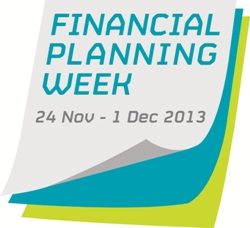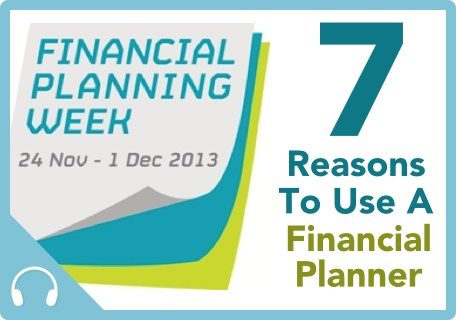 Here we are at session number 38 , and we’re going to be talking about Seven Reasons to use a Financial Planner.
Here we are at session number 38 , and we’re going to be talking about Seven Reasons to use a Financial Planner.
This week is financial planning week, a fantastic initiative by the Institute of Financial Planning to bang the drum about the benefits of true planning and using a CFP professional to help get your financial life in order.
There’s tons of great information over at the Wayfinder site which is the consumer-facing part of the Institute site.
For my bit, I thought I’d bang the drum a bit more here on the podcast. You know that I always say that good advice will pay for itself many times over. Conversely, bad advice can cost you dearly. Financial Planning is more than just product advice, it is a relationship with an expert adviser who will take the time to get to know you and your needs, wants and hopes and then help you organise your finances to make those things happen.
Click to Listen
Podcast: Subscribe in iTunes | Play in new window | Download
Before we get to our seven reasons…
 Sponsor Message
Sponsor Message
This podcast is brought to you with the help of Seven Investment Management, a firm of investment managers based in London. They put their name to my show and to my site and videos because they believe in what I’m doing, and I’m very grateful for their support. You can see what they’re up to at 7im.co.uk
Introduction
If you listen back to Session 8 I go through everything you need to know and do to find a decent financial adviser. There I talk about different levels of qualifications and specialisms. There I suggest that the best advisers in the country are those with the Certified Financial Planner or CFP qualification. It is, to my mind, the only qualification that really tests financial planning in application, rather than just exam-passing. CFP advisers are tested to international standards and have to produce a live financial plan in order to be certified.
So here are my seven reasons why I think everyone can benefit from dealing with a CFP. At the end I’ll tell you the quickest way to find a CFP in your area and give you some other things to think about.
What you need to know
1. It’s about you, not your money
When I meet a prospective client for the first time, I always ask them if they have ever used an adviser before. For those who have, without exception they report that the process seemed to be geared towards one thing – being sold a financial product of some kind.
The whole regulatory system is set up for this. Because financial products can be dangerous in the wrong hands, the Financial Conduct Authority regulates the sale of those products and places constraints on the process of sale such that it seems to be like a funnel, edging the client towards a nice compliant product purchase.
Financial Planning is not about products, it is about you. Sure, products are the tools that the financial planner has at their disposal if needed, but very often your goals could just as easily be met by tweaking some existing plans, or making a will or setting up a trust.
A financial planner will take the time needed to get to know you first, without even thinking about what products might be needed at the end of the process. And even when products are needed, the abolition of commission on investment and pension products means that the adviser should not be biased in favour of one over the other, meaning you get the best outcome for you.
A financial planner will very often resort to a process called Cashflow Modelling, where they can map out your financial future using software tools and some assumptions agreed between you about things like inflation and investment growth. For many clients this is the first time they have been able to visualise their future – it’s very powerful. I once took a client through this process and she sent me a thank you card at the end saying “thank you for helping me see my finances in the sunshine rather than the rain” – How cool is that?!
As I often say here on MeaningfulMoney, money is a tool, a means to an end, never and end in itself. It is there to serve you and your life goals, not the other way around. A good financial planner can help you bend your money to your will and help you use it to shape your own future.
2. Organisation
I have met all kinds of people as a financial planner. I have met those who are super-organised and those who are catastrophically disorganised. I remember meeting my very first client at my very first job in financial services. My sales manager and I were chatting to them and they pulled out a suitcase full of policies, bank books etc. We went through it with them and they kept picking up bank books and saying things like “huh – we’ve got £15,000 in the Nationwide BS, I’d forgotten we had that.” I just remember thinking how can you not remember you’ve got fifteen grand lying around?!
The fact is, most people do not engage properly with their money. They don’t want to do it, which I entirely understand. Organising bank statements and policy documents is less attractive than pretty much anything else.
Weirdly, I’ve met lots of business owners whose companies run like clockwork. Their offices are immaculate, with everything in its place. But then their personal finances are all still in envelopes int eh second drawer down on the left hand side of the study desk. They have no idea what they really have got at all.
A financial planner, as part of the process, will help you to get organised. For many people, the value of the whole process is right there. Finally they know where they are and what they have got.
Going forward then, when the planner has reviews with clients, they will get the filing up to date, discard old stuff, pull out things that need to be given to the accountant etc.
Clients are often amazed at how quickly I can go through a stack of paperwork and identify what to keep and what to throw away, leaving a pile a fraction the size it was, in neat date-ordered sections. If you’re naturally chaotic when it comes to financial organisation, this can be a great service.
3. Goal-setting
Most people cannot visualise their future. That makes sense, right? The future is in the future, we can’t see it. But we can shape it to a large extent by setting goals.
There is much evidence that setting measurable goals is essential if you’re ever going to reach them. Having a vague idea of where you want to be is one thing, but having something measurable and time-bound seems to kick the universe into shape and inspire you to make the goals happen.
A financial planner can help you both vocalise and visualise your goals. If you are a couple, then a good planner can help facilitate a discussion between you so you’re running on the same track and working towards the same things.
Cashflow modelling can be used to model different scenarios and outcomes and to see if you are on track to meet your goals. If not, you can adjust what you are doing with your finances to pivot and get back on track. Or you can adjust your goals in some way to meet the reality.
A financial planner can help you dream and then make those dreams concrete and give you clear steps towards achieving them.
4. Accountability
Most people are good starters and lousy finishers. I wonder how many of you listening to this have got half-sorted filing cabinets, or half-decorated bathrooms; half-dug gardens or half-finished crosswords. We are, as a species good at starting things and generally poor at finishing things off.
Life gets in the way very often, and the best laid plans and all that… But often the difference between your financial plan sitting on a shelf never being looked at is having someone to hold you to it. At a regular review, a decent financial planner should measure your progress against the plan. Are you ahead or behind where you expected to be at this point along the timeline?
Your planner is not their to hit you over the head with a baseball bat if you don’t hit your numbers. But they will act as a coach and as your biggest fan as you head towards your goals. They will be constantly encouraging you to stick at it, reminding you of the goals you had in the first place, and holding them out in front of you as you move forward.
As a serial dieter, I can tell you that I have most success in sticking to the plan when I stay for the meeting after the weigh-in. All the stats from WeightWatchers and Slimming World and all the others show this to be the case. If something is worth doing, it usually takes a while and when things take a while, you can get discouraged along the way. Your adviser will help you stick to the plan through thick and thin.
5. Relationship
For many of my clients I have been dealing with them for more than ten years. Over this time I have seen all kinds of family triumphs and tragedies. I have attended family weddings and funerals. Many of my clients see me as a friend first, and adviser second. In turn they share my own challenges and family news and encourage me whenever I see them.
In some cases, I know far more about the financial situation of a couple than their own children do, and they are trusting me to sort things out after they have gone – what an incredible privilege. The relationship I have with my clients is incredibly important to me and I know it is to them too.
Many people never talk about their finances or wider situation including health and family, to anyone other than their adviser. You might think that is sad, but some families just don’t have healthy, open conversations about these things.
If you can find an adviser who you can get to trust in this way, the relationship will be a rich one for you and for the adviser. They will ask questions that perhaps no-one else dares to ask and challenge you where you need to adjust your thinking on things. It really can become a very fulfilling relationship, which you would never get from an adviser who just sells you financial products.
6. Detail
Most clients don’t understand, or want to understand the finer points of the pension they took out in 1978. They don’t understand that it could have valuable benefits way over and above what is outlined on the annual statement, which often is left in the envelope in that third drawer down.
It is a financial planner’s job to know these things, or to find them out for you. If they miss something important, there is no excuse. They are paid to get such an intimate picture of your financial situation that they know it way better than you do.
They also know the right questions to ask the providers of your financial products that you have amassed over the years and to chase those providers when they try not to provide the information required – yes, they do this all the time.
They should know about tax change, market movements, new risks and opportunities. Even if you adviser personally is not a details person, they will have someone on staff who is, or they should do. The best advisers know their weaknesses and hire people to fill those gaps.
So an adviser can be a source of technical help and detail, particularly at the pivotal points in your financial life, such as retirement, or getting married.
7. Expertise
Finally, your adviser should be an expert. In many ways this is similar to being a details person, but there is no point in paying for someone who when you ask a question, just looks things up on the internet like you can.
Often, expertise comes with experience in applying head knowledge to real-life situations. Again I go back to the Certified Financial Planner license requiring licensees to have applied their expertise in real-life situations. I have no memory for fat and figures. I cold not tell you what it means to have a pre-Royal Assent pension. But I can give you examples of where myself or now of my colleagues have come across a case where it was necessary to know that in order to do the right thing at that point.
You want to know that you adviser knows the best thing to do at any given point. And not just the best thing in the abstract, but the best thing that you can do for your specific situation.
——-
So, all in all, some good reasons to use a financier planner when you’re making decisions about your future. They will add value in many ways, and hopefully it’s clear that it really is not about flogging financial products.
What do you need to DO this Financial Planning Week to move forward with your personal finances?
Everything you need to DO
1. Find a Financial Planner
The only place you can go to limit your search just to Certified Financial Planners is the Institute of Financial Planning Wayfinder website and click on find a planner. It’s a straightforward postcode search which offers links to the websites of planners in your area.
2. Read some info in preparation
On the Wayfinder site there some great guides to give you some food for thought in advance of meeting with a financial planner, or just to get the juices flowing about sorting out your own finances.
That’s it for your to-do list this week – let me know how you get on. But don’t lose the opportunity to think about your finances, maybe for the first time ever. Money can be used to great effect, you just need to harness it and bend it to your will. Financial planning allows you to do just that.
——
This week’s reviews
A couple more lovely reviews this week, the first from Jayson Hall:
“MeaningfulMoney encouraged me to rethink my whole approach to personal finance. Pete tackles all the fundamental areas anyone would need to get their finance on the right track. Regardless of your current situation, this podcast delivers clear and concise guidance that everyone can take heed of. Follow Pete’s advice and your future will be bright!”
Thank you Jayson, and thanks for your emails too – they are very much appreciated. The second review comes from Tammy_P:
“What more can I say that hasn’t already been said? This is delivered in a way that makes the whole maze of personal finance less daunting- offering clarity, practical information and it is very comprehensive. You can tell this chap is not one to cut corners.”
I love that last bit. I have been known to be a bit anally retentive at times Tammy. So glad it comes across!
If you want to leave me a review, head over to meaningfulmoney.tv/iTunes to do so. It helps keep me at the top of the rankings and helps others to see the show and to subscribe.
Outro
That's it for this session of the MM podcast, I hope it was helpful. Any questions or comments, please leave them in the comments section below
I hope you enjoyed this session. Next time we'll be talking about my personal finance Room 101. All the crap in financial services I’d like to get rid of, we’ll be covering. I’m looking forward to venting already!
If you have any questions about this, go to meaningfulmoney.tv/feedback and leave a voicemail
Thanks for listening – I'll talk to you next time



Leave a Reply